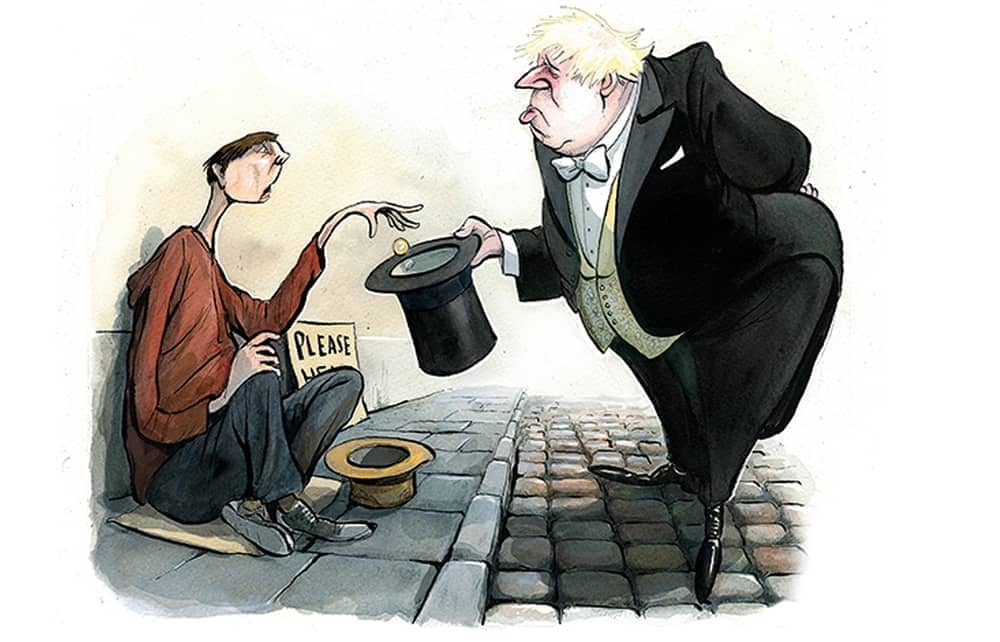A little over a year ago, The Spectator printed a cover story about the risk of inflation. Britain, we argued, was hugely vulnerable: the national debt was structured in such a way that even a small uptick in inflation followed by a rise in interest rates would inflict immense damage on public finances. The conventional wisdom was that there was no such risk, that rates would be ‘low for long’. But what if this consensus was wrong? The Financial Times took the unusual step of writing a story about our story. ‘The Spectator joins the inflation doom-mongers,’ it announced.
‘Doom’ was pushing it a bit: we simply sought to underline the complacency with which governments, central banks and many analysts viewed the economic horizon. Lack of concern about inflation was all the more dangerous because it helped justify the spending, borrowing and money-printing of the post-crash years – and the response to the pandemic. It confirmed that any belief that a ‘modern monetary theory’ had done away with the need to balance budgets was misguided. As it turns out, basic economic rules always applied. The big spenders ended up unleashing forces that they have since struggled to control, or even understand.
Yes, the problem is global. Joe Biden borrowed a trillion dollars and spent it on a rebounding American economy, which was always going to have risks for the world economy. But Britain was just as bad, extending lockdowns for far longer than was necessary and printing £400 billion to pay for it, while all the time saying that inflation would not return. In November, the Bank of England thought that inflation would peak at 5 per cent, more than double its target. In February, it thought 7 per cent. Now it says 11 per cent, and even this might not be the worst of it. The price of petrol is rising much faster, with many drivers paying £2.20 a litre, against an average of £1.30 last year. While the Ukraine war has forced up fuel prices, this is only part of the problem. Workers everywhere will see the value of their salaries decline – while having to hand over a greater slice to the government than at any time in living memory.
The government is now 55 per cent larger than it was even in the Blair years
With such misery in prospect, it’s no wonder that the unions are demanding more pay. Their tactics work. Unions have, over the years, helped the average train driver to be paid a salary twice that of the average passenger. Striking is an effective tool of leverage, and the RMT’s donations of almost £250,000 to the Labour party over the past ten years have secured it allies in parliament. Two dozen Labour MPs joined the picket lines this week. Why would the unions not keep pressing ahead? There’s no incentive to stop.
More strikes will be coming. Employees of several former state-run companies – Royal Mail, British Airways and BT – are considering industrial action. Civil servants and teachers could be next. The Royal College of Nursing, a union representing NHS workers, wants a pay rise of five percentage points above inflation – which, if granted, would be a massive bite into an NHS budget that will soon account for 44 per cent of day-to-day public service spending by the state (up from 27 per cent 20 years ago). How much money will be left to try to deal with an NHS waiting list which is now at six million, and is expected to rise to nine million?
The problem for Boris Johnson is that he now has a reputation for caving in to pressure. He struggles to survive on an almost weekly basis, and his government loses almost every fight, including battles with footballers. It makes perfect sense for the unions to push him, and to expect that at some point he will buckle.
The average public sector pay rise is 2 per cent: any more, the government says, would be inflationary and irresponsible. But the ‘triple lock’ policy means state pensions are guaranteed to rise with inflation. So once again older voters are protected while the young are told that there’s nothing to be done.
All this will present obvious problems at election time. Tories are panicking already, but their ideas will come to nothing unless they see that the only solution is to cut the cost of government. High taxes hold back economic growth and make everyone poorer. So it’s time to ask whether we really want to pour £300 billion a year into a welfare system that doesn’t work properly and to keep 5.3 million on out-of-work benefits in a labour shortage.
Radical thinking is needed once again, and new arguments will be required. This presents a problem for a Prime Minister who came to office with the expectation of constant borrowing – dismissing concerns from those who warned that inflation might return. He can shake the magic money tree all he likes, but there’s no cash left. Johnson has weighed down the economy by presiding over a government that is now 55 per cent larger than it was even in the Blair years.
The strikes are just one of the many side-effects of inflation. The only option now for Johnson is to start charting a course towards restraint on spending, to lift the huge burden of taxation and give the economy a chance to recover. This will be a long, slow process, but if the Tories are serious about governing, they must start it now.






Comments